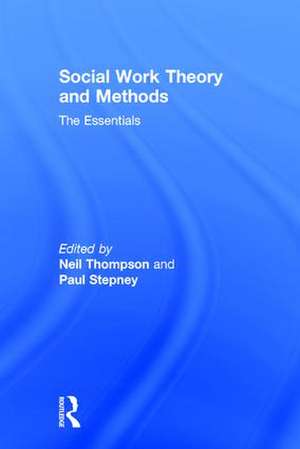Social Work Theory and Methods: The Essentials
Editat de Neil Thompson, Paul Stepneyen Limba Engleză Hardback – 28 sep 2017
| Toate formatele și edițiile | Preț | Express |
|---|---|---|
| Paperback (1) | 354.21 lei 43-57 zile | |
| Taylor & Francis – 2 oct 2017 | 354.21 lei 43-57 zile | |
| Hardback (1) | 784.00 lei 43-57 zile | |
| Taylor & Francis – 28 sep 2017 | 784.00 lei 43-57 zile |
Preț: 784.00 lei
Preț vechi: 956.10 lei
-18% Nou
Puncte Express: 1176
Preț estimativ în valută:
150.07€ • 163.06$ • 126.14£
150.07€ • 163.06$ • 126.14£
Carte tipărită la comandă
Livrare economică 21 aprilie-05 mai
Preluare comenzi: 021 569.72.76
Specificații
ISBN-13: 9781138629769
ISBN-10: 1138629766
Pagini: 276
Ilustrații: 12
Dimensiuni: 152 x 229 x 18 mm
Greutate: 0.5 kg
Ediția:1
Editura: Taylor & Francis
Colecția Routledge
Locul publicării:Oxford, United Kingdom
ISBN-10: 1138629766
Pagini: 276
Ilustrații: 12
Dimensiuni: 152 x 229 x 18 mm
Greutate: 0.5 kg
Ediția:1
Editura: Taylor & Francis
Colecția Routledge
Locul publicării:Oxford, United Kingdom
Public țintă
UndergraduateCuprins
Part One
Chapter 1: Theory and Methods in a Practice Context: Theorizing Practice
Neil Thompson
Chapter 2: Theory and Methods in an Intellectual Context: Using Research
Paul Stepney and Neil Thompson
Chapter 3: Theory and Methods in a Policy and Organizational Context: International Perspectives
Paul Stepney
Part Two
Chapter 4: Psychodynamic Theory
Malcolm Payne
Chapter 5: Cognitive-Behavioral Therapy
Paul Stepney and Paul Davis
Chapter 6: Task-Centered Practice
Ronald Rooney
Chapter 7: Crisis Intervention
Neil Thompson
Chapter 8: Narrative Approaches
Louise Harms
Chapter 9: Existentialism
Neil Thompson
Chapter 10: Solution-focused Practice
Suki Desai
Chapter 11: Mediation
Wing Hong Chui
Chapter 12: Social Pedagogy
Juha Hämäläinen
Chapter 13: Family Therapy
Robert Taibbi
Chapter 14: Group Work
Mark Doel
Chapter 15: Ecological Theories
Aila-Leena Matthies and Kati Närhi
Chapter 16: Activism and Advocacy
Donna Baines, Emma Tseris and Fran Waugh
Chapter 17: Community Social Work
Paul Stepney
Chapter 1: Theory and Methods in a Practice Context: Theorizing Practice
Neil Thompson
Chapter 2: Theory and Methods in an Intellectual Context: Using Research
Paul Stepney and Neil Thompson
Chapter 3: Theory and Methods in a Policy and Organizational Context: International Perspectives
Paul Stepney
Part Two
Chapter 4: Psychodynamic Theory
Malcolm Payne
Chapter 5: Cognitive-Behavioral Therapy
Paul Stepney and Paul Davis
Chapter 6: Task-Centered Practice
Ronald Rooney
Chapter 7: Crisis Intervention
Neil Thompson
Chapter 8: Narrative Approaches
Louise Harms
Chapter 9: Existentialism
Neil Thompson
Chapter 10: Solution-focused Practice
Suki Desai
Chapter 11: Mediation
Wing Hong Chui
Chapter 12: Social Pedagogy
Juha Hämäläinen
Chapter 13: Family Therapy
Robert Taibbi
Chapter 14: Group Work
Mark Doel
Chapter 15: Ecological Theories
Aila-Leena Matthies and Kati Närhi
Chapter 16: Activism and Advocacy
Donna Baines, Emma Tseris and Fran Waugh
Chapter 17: Community Social Work
Paul Stepney
Notă biografică
Neil Thompson, PhD, DLitt, is an independent writer and educator specializing in online learning. His books include the bestselling Anti-Discriminatory Practice, Understanding Social Work: Preparing for Practice, and People Skills (all published by Palgrave). He is a sought-after consultant and conference speaker. His website and blog are at www. neilthompson.info.
Paul Stepney, PhD, is Adjunct Professor of Social Work at the University of Tampere, Finland and visiting professor at two other Finnish universities. Prior to this he has taught at four UK universities and worked as a hospital social worker. Paul’s research interests are in critical practice and prevention, and he is co-author of two books on social work.
Paul Stepney, PhD, is Adjunct Professor of Social Work at the University of Tampere, Finland and visiting professor at two other Finnish universities. Prior to this he has taught at four UK universities and worked as a hospital social worker. Paul’s research interests are in critical practice and prevention, and he is co-author of two books on social work.
Descriere
This gateway text lays the foundations for a thorough knowledge of the theory and methods that social workers need. Pulling together the work of a team of experts, this book uses the innovative "theorizing practice" approach, rather than the traditional "applying theory to practice" approach, thereby providing a much more satisfactory basis for understanding the relationship between theory and practice and making it easier for practitioners to employ theory in practice.
Part One sets the scene by examining the relationship between theory and practice, how research can be used to inform practice and the important role of policy and organizational factors. Part Two provides 14 chapters, each exploring a different theoretical approach. All in all, this book provides the ideal introduction to using social work theory and methods in practice.
Part One sets the scene by examining the relationship between theory and practice, how research can be used to inform practice and the important role of policy and organizational factors. Part Two provides 14 chapters, each exploring a different theoretical approach. All in all, this book provides the ideal introduction to using social work theory and methods in practice.
